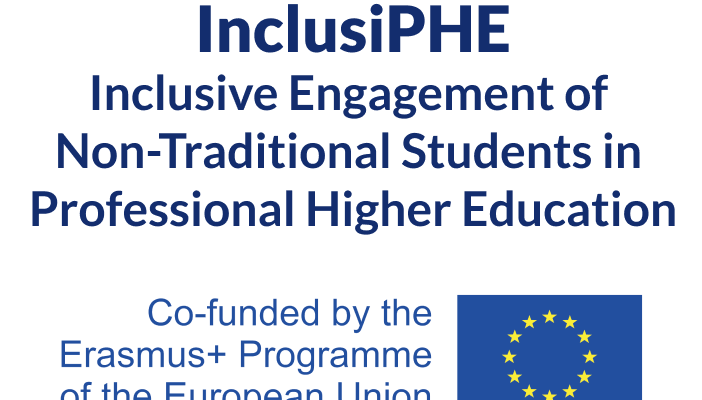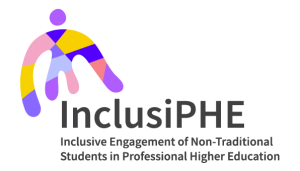
Inclusive Engagement of Non-Traditional Students in Professional Higher Education (InclusiPHE)
Project Start Date – 2020-09-01
Project End Date – 2023-08-31
Background
On 25 May 2018, European Ministers of higher education adopted the Paris Communique in which they reiterated their commitment to the goals and policies of the European Higher Education Area, whilst also acknowledging that “further effort is required to strengthen the social dimension of higher education”, since “the student body entering and graduating from European higher education institutions should reflect the diversity of Europe’s populations” and that there is a need to “improve access and completion by under-represented and vulnerable groups.”
Description and Objectives
The InclusiPHE project connects the social dimension of HE with another fundamental pillar of the EHEA – students’ engagement – and has as main objective to contribute to creating a more inclusive environment at PHEIs, by creating sets of interventions aimed at increasing non-traditional students’ engagement in the life of their academic institution. To respond to the needs and challenges of wider society students need to obtain key competences for active citizenship. These competences can be developed through students’ engagement to University governance and participation in decision making at various levels, inclusive strategies by student-led organizations, inclusive curricula, participative working methods and partnerships between PHE providers, local communities and civil society organisations. Also to maximise the retention and success of non-traditional students, an inclusive learning the environment is central and research has demonstrated that student retention and success is improved through effective student engagement and sense of belonging.
InclusiPHE will focus specifically on students at PHEIs who typically attract a more diverse range of students with a higher proportion of non-traditional students compared to more
classical universities. There tend to be more adult students, lifelong learners, parent students, students from a migrant background, students with a disability, etc. At the same time, PHE curricula have specific characteristics that influence student engagement which is often overlooked in European and national higher education policy discussions, such as shorter times spent in the institution due to many students studying at shorter courses and considerable time spent on practical placements outside the institution.
InclusiPHE will explore the complex engagement of different students in the life of their institutions. The project aims to improve policies, mechanisms and practices for inclusive engagement of all students regardless of their background and circumstances – to engage students in all aspects of teaching & learning journey, quality assurance & institutional decision making, within the life of the institution and student life in the wider sense and also enabling them to fully embrace the democratic values of HE in their interactions with wider society.
More concretely, the project will:
- Analyse existing models and patterns within students’ engagement at PHE institutions.
- Identify potential good practices and innovative ways of a more inclusive engagement of PHE specific target groups
- Develop student-led strategies for creating more inclusive PHEIs and student organisations.
- Develop a Capacity building toolkit and pilot inclusive students’ engagement training.
The project will result in:
- Increased information (quantitative and qualitative) on inclusive engagement of PHE students at European, national and institutional level.
- Better understanding of the impact of more inclusive students’ engagement in the governance, internal QA and curriculum development of PHEIs and in the advancement of equality and inclusion.
- Increased awareness of students, institutional leaders and policy makers on inclusive students’ engagement in the PHE sector and of the European vision and consensus on students’ engagement and social inclusion.
- Enhanced support of PHEIs and students’ organisations in their efforts to increase participation of non-traditional and underrepresented groups within PHE institutional formal and informal systems of students’ engagement.
- Provision of instruments, methods and tools PHE institutions and students’ organisations can apply to support the development of an inclusive students’ engagement culture within their institutions and organisations.
The InclusiPHE consortium consists of 8 members and is led by Mondragon University (Spain). Other partners are the European Students’ Union (Belgium), the European Association of Institutions in Higher Education – EURASHE (Belgium), the Institute for the Development of Education (Croatia), Malta College of Arts, Science and Technology (Malta), Knowledge Innovation Centre (Malta), Duale Hochschule Baden-Wurttemberg (Germany), University College Leuven-Limburg (Belgium).

